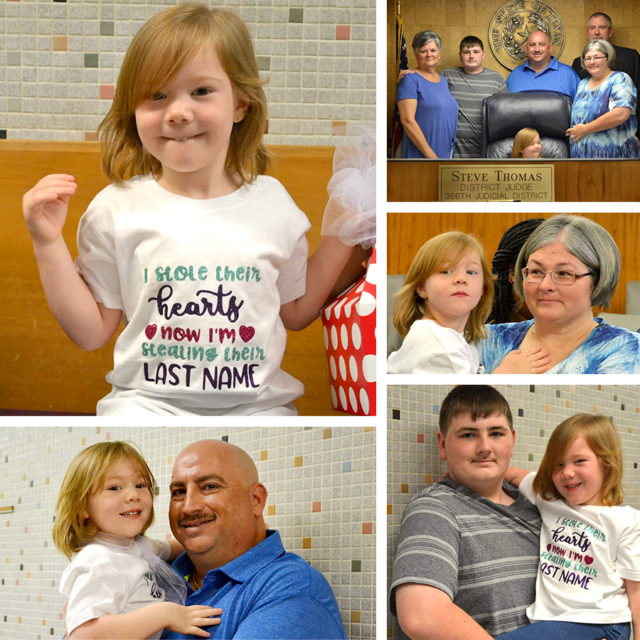 At the age of 30, Chris and Stephanie Johnson had their first child. Three years later they wanted to grow their family, but they soon discovered adoption was the only way it could happen. They didn’t have the $30,000 to $60,000 it would take for a private adoption, so they put it in God’s hands, and for nearly a decade they just went on with their lives. That is until last year, when God used a truck in need of repairs and the flooding of Hurricane Harvey to fulfill Chris and Stephanie’s greatest desire.
At the age of 30, Chris and Stephanie Johnson had their first child. Three years later they wanted to grow their family, but they soon discovered adoption was the only way it could happen. They didn’t have the $30,000 to $60,000 it would take for a private adoption, so they put it in God’s hands, and for nearly a decade they just went on with their lives. That is until last year, when God used a truck in need of repairs and the flooding of Hurricane Harvey to fulfill Chris and Stephanie’s greatest desire.
In March of 2017, Stephanie began feeling the pull to complete her family. Even though Chris thought after 10 years they had waited too long, Stephanie hopefully said, “No, let’s just pray about it.”
“Okay, God is going to show a sign,” Stephanie told Chris. “God is going to start opening the doors. When he does, are you ready?” Chris was onboard, but neither of them dreamed it would be just three months later when doors would start opening.
Chris was at the car dealership in Winne, Texas where he was the service manager, when Gregory Wysingle, an adoption coordinator for Arrow came in for truck repairs. Gregory had been on his way to court to participate in a case to have parental rights terminated when he realized he had pushed his luck too far with his truck. It had to be repaired now, even though he was far from home.
During their conversation, Gregory shared that he facilitates adoptions for children in the foster care system. And Chris shared that he and Stephanie had been praying that God would provide a way for them to adopt.
“When Chris came home, he laid Gregory’s business card on the counter,” said Stephanie. “I was in the middle of dinner. Dylan (their 15 year-old son) wasn’t having a good day. And when Chris told me he had a visitor today, I sarcastically told him…you have visitors every day. He said it was a special visitor, and I told him, yeah, I really don’t want to hear about it right now.”
So Chris just left the business card on the counter and went to change clothes. Stephanie looked at the card and saw Gregory’s title.
“So here I go chasing Chris through the house,” said Stephanie. “He told me about Gregory and that he was willing to come to the house to give us more information.”
When Gregory explained all the subsidies adoptable foster children qualified for, and the minimal cost to the adoptive parents, Chris and Stephanie were ready. But then Stephanie described the child she wanted to adopt, and Gregory explained it didn’t work like that. Stephanie needed time to process the idea that she wouldn’t be able to get the child she had longed for over the past 10 years.
Chris and Stephanie discussed the adoption opportunity during a long driving trip all the way to and from Florida. They agreed to hit the ground running as soon as they got back. They completed their foster parent training in just four weeks, and a month later they were licensed foster parents. Thinking they had several months to prepare for their first foster child, they were surprised when in just a matter of days they got the phone call.
“She asked me if we would take a respite,” said Stephanie. “I told her I must have slept through that part of the class, and I asked, what is a respite?”
Stephanie was told there was a foster family that had a 4 year-old girl named Destany, who just needed a temporary place to stay for five days. Even though everyone in southeast Texas, including the Johnsons, were getting ready for Hurricane Harvey, Stephanie agreed to take Destany…for five days.
Destany’s foster mom called Stephanie to arrange the transfer. She explained that Destany’s brother had medical issues, which meant lots of doctor visits. And because of all the attention her brother was needing, Destany would act-out with self-inflicted scratches, and self-inflicted head wounds. The mom would continue to foster Destany’s brother (and later adopt him), but Destany was just too much for her to handle.
“When I got off the phone, I thought, oh my dear lord, what have I gotten myself into,” said Stephanie. “Then when I went to pick up Destany, the foster mom brought more than just a few changes of clothes. She brought all of Destany’s belongings.”
When Stephanie called the Arrow Beaumont office for clarification, she was told that the foster mom couldn’t handle the children by herself anymore and they wouldn’t be going back. Arrow explained they were hoping to find a placement for Destany during the five days she would be with the Johnsons, but that the foster mom had been specifically told not to bring all the child’s belongings.
That night, the flooding of Hurricane Harvey started. The next morning Stephanie and Chris were having a cup of coffee and watching the hurricane updates when they heard the pitter patter of little feet coming down the hallway. Destany turned the corner, threw up her hands and exclaimed, “Momma, I’m home!”
Stephanie looked at Chris and said, “What do we do? She’s not home. She’s only here for five days!”
They attempted to discourage her, but Destany wasn’t buying it. And when Stephanie told her their first names, Destany said, “No. Mommy. Daddy.” And after introducing their 15 year-old son Dylan, Destany instead, called him “bubba.” Destany was very emphatic and could not be swayed.
Then five days turned into 10, then 15. This was Destany’s fifth placement since entering foster care at 16 months-old, and Stephanie told Chris that something had to be done.
“Are you ready to let her go,” asked Chris.
“No, that’s the problem,” said Stephanie. “She’s forming a bond with us. And if they don’t move her, it’s only going to hurt her more, and it’s going to devastate me.”
Once all the flooding receded, a CPS caseworker came to do a home visit so Destany could stay, but she wanted Stephanie and Chris to also take Destany’s younger brother. But Stephanie explained that Destany had not once acted out or hurt herself since being away from her brother, and they weren’t going to disrupt Destany’s progress by bringing her brother into their home. The caseworker went back to her office and explained to her supervisor the remarkable change in Destany. They decided to arrange a conference call between the CPS staff and Arrow staff to decide if the siblings should be separated.
“On the day of the conference call I was on pins and needles,” said Stephanie. “I was just watching the clock and praying. Then the phone rang. They said I could tell Destany she was home. So when she woke up, I told her she was home, that she wasn’t going to have to move anymore, and that this was her home forever. She looked at me with the biggest grin, and said, ‘I know that.’ Then turned around and walked off.”
After delaying the adoption because of Chris’ mother being ill, the adoption was consummated on June 28, 2018, Destany’s fifth birthday. Along with her new family, she now has a new name, Alivia Joy, who on day one with the Johnsons, prophetically proclaimed…“Momma, I’m home!”

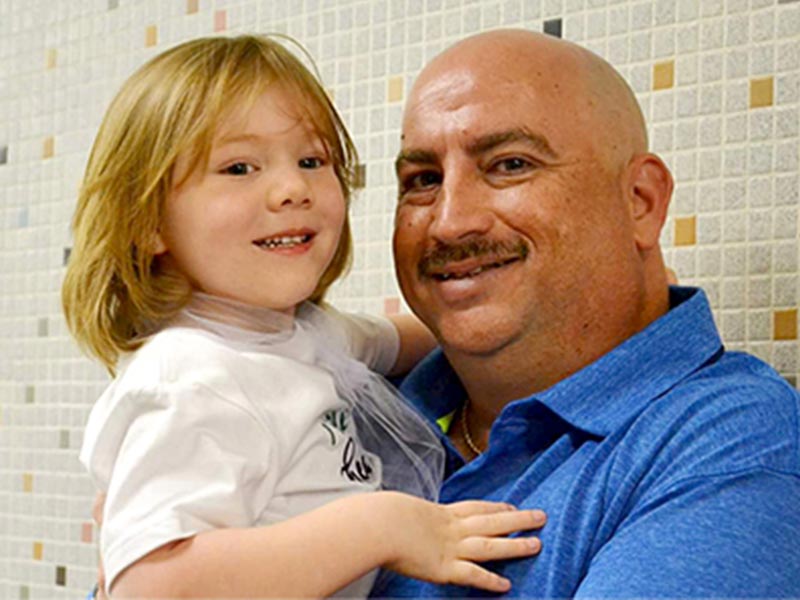
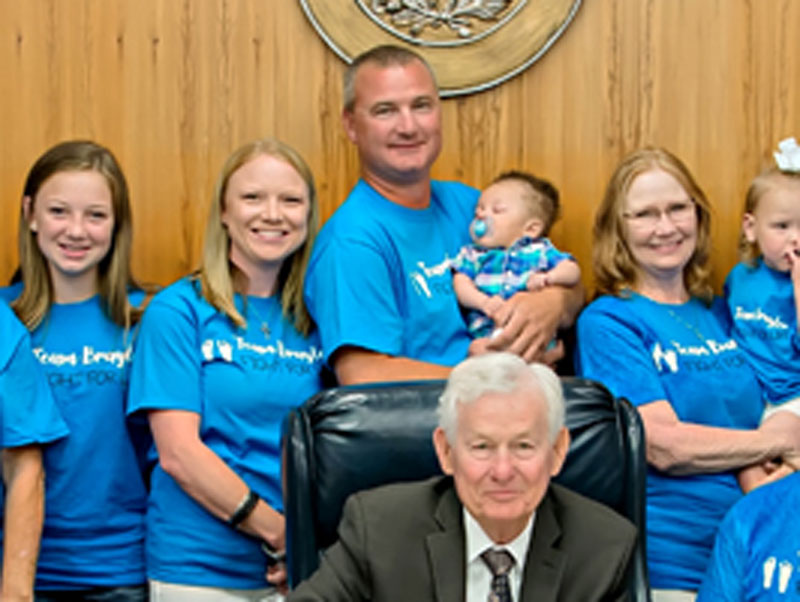
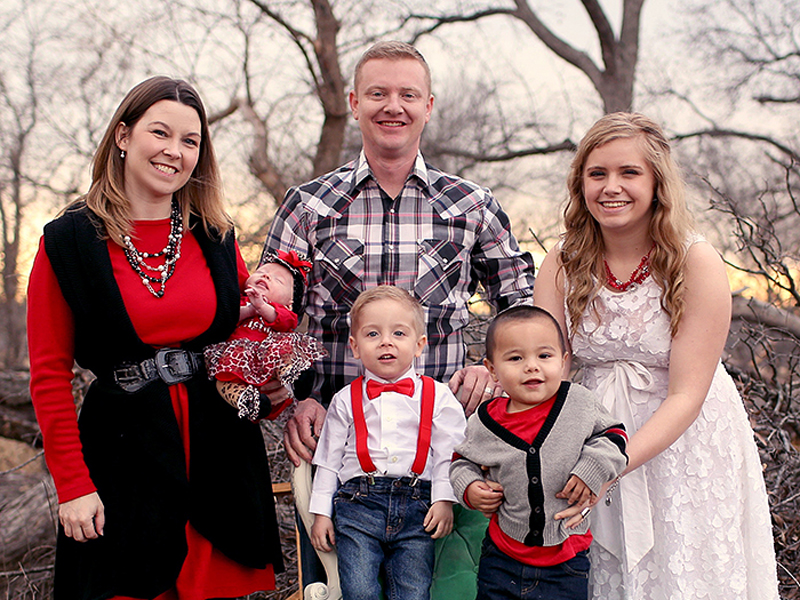

 Finally, through Vaughn’s adoption at 15 months old, this loving couple had become what they prayed for…a loving family. But the Maiers were about to experience Ephesians 3:20 which says that God “is able to do immeasurably more than all we ask or imagine, according to his power that is at work within us…”
Finally, through Vaughn’s adoption at 15 months old, this loving couple had become what they prayed for…a loving family. But the Maiers were about to experience Ephesians 3:20 which says that God “is able to do immeasurably more than all we ask or imagine, according to his power that is at work within us…” In December 2014, Ashlyn’s adoption was finalized, and the state dropped Jace’s case since he and his mom were now in a stable home environment. Not only did Valarie and Evan have Ashlyn as a new daughter, but they also had Jace as a new grandson. But the biggest surprise of all happened just three months earlier when Valarie gave birth to their newest daughter, Meridian. With three kids under three-years-old, “It was a party at our house all the time,” said Valarie.
In December 2014, Ashlyn’s adoption was finalized, and the state dropped Jace’s case since he and his mom were now in a stable home environment. Not only did Valarie and Evan have Ashlyn as a new daughter, but they also had Jace as a new grandson. But the biggest surprise of all happened just three months earlier when Valarie gave birth to their newest daughter, Meridian. With three kids under three-years-old, “It was a party at our house all the time,” said Valarie. Today, Ashlyn is a high school graduate, she is employed, and Jace is in school, and they have their own apartment. The desire of Ashlyn’s heart is to help other kids who go through the same type of turmoil she has overcome, so she is currently considering her college options in order to pursue a career in counseling.
Today, Ashlyn is a high school graduate, she is employed, and Jace is in school, and they have their own apartment. The desire of Ashlyn’s heart is to help other kids who go through the same type of turmoil she has overcome, so she is currently considering her college options in order to pursue a career in counseling.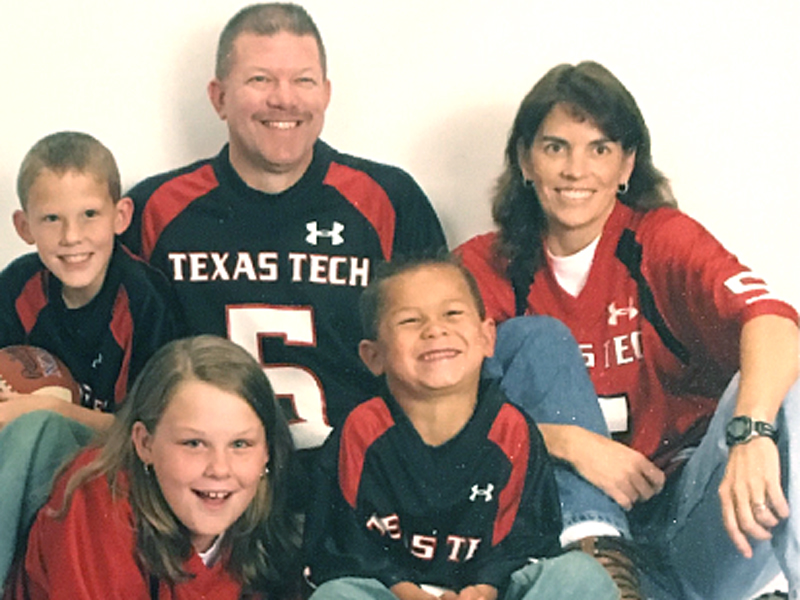


 Recently Misty and Randy Bailey adopted Hagen after fostering him for nearly three years. During their journey, the Baileys faced every possible emotional and physical challenge any home could possibly take.
Recently Misty and Randy Bailey adopted Hagen after fostering him for nearly three years. During their journey, the Baileys faced every possible emotional and physical challenge any home could possibly take.





